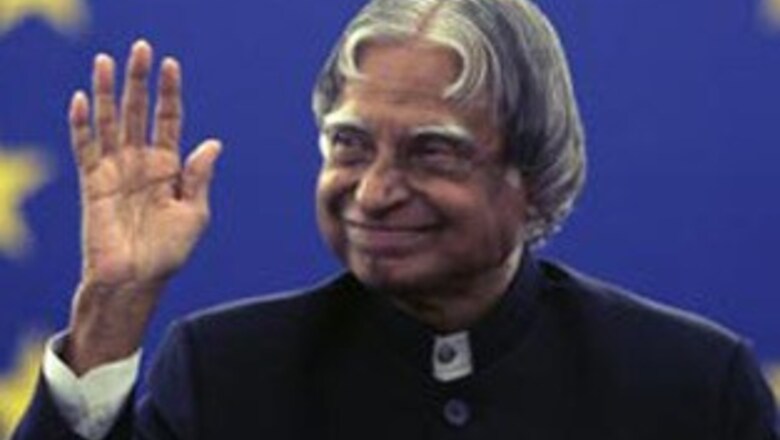
views
New Delhi: Former president APJ Abdul Kalam on Thursday defended India's nuclear deterrence capability even as former national security adviser (NSA) Brajesh Mishra rubbished a top scientist's claim that the 1998 Pokhran tests were not successful.
Kalam, who mentored India's nuclear programme, said the only thermonuclear device tested in 1998 produced the "desired yield".
K Santhanam, who coordinated the Pokhran II tests, was on Thursday quoted as saying that the only thermonuclear device tested was a "fizzle".
A test is described as a fizzle when it fails to meet the desired yield.
Responding to a query from IANS, Kalam said: "After the test, there was a detailed review, based on the two experimental results: (i) seismic measurement close to the site and around and (ii) radio active measurement of the material after post shot drill in the test site."
"From these data, it has been established by the project team that the design yield of the thermonuclear test has been obtained," he added.
Months after the Pokhran tests, Kalam had said that the thermonuclear device produced a 45 kilotonne yield.
"The question is: Do we believe him or do we believe his boss (Kalam)?" Mishra retorted when asked by IANS about Santhanam's remarks.
"(Santhanam) is misleading the country. He is perhaps saying all this because he is so opposed to the CTBT (Comprehensive Test Ban Treaty)," Mishra said when asked why Santhanam was sowing seeds of doubt in the people's minds about India's nuclear capability.
Kalam had last year come out in support of the landmark India-US nuclear deal, saying New Delhi did not need to test again as its deterrence capability was strong enough.
According to Santhanam, a former official with the Defence Research and Development Organisation, "we can't get into a stampede to sign CTBT. We should conduct more nuclear tests which are necessary from the point of view of security". Santhanam made these remarks to IANS on Thursday.
This runs contrary to assertions by other scientists and top officials involved with India's nuclear programme.
R Chidambaram, who was in 1998 chief of the Department of Atomic Energy (DAE), is on record as saying that the bomb's yield was 45 kilotonnes (45,000 tonnes of conventional explosive).
Santhanam's remarks have not gone down well with the government.
"I have seen the report. I am puzzled. The government will find out, somebody will brief you," Home Minister P Chidambaram said after a meeting of the cabinet committee on economic affairs.
Official sources dismissed Santhanam's remarks and underlined that India's opposition to CTBT remains unchanged.
"We will not be signatory to any agreement which is discriminatory in nature," a source said.
Santhanam's remarks are bound to create a flutter in the non-proliferation establishment in the US and may raise fresh doubts about the future of the India-US nuclear deal which will unravel if New Delhi were to test again.
Santhanam's assessment is set to bolster India's opposition to signing the CTBT - an issue that may figure in the discussions when Prime Minister Manmohan Singh goes to the US in November.
India has opposed the CTBT on grounds that it is discriminatory and tends to divide the world into nuclear haves and have-nots.



















Comments
0 comment